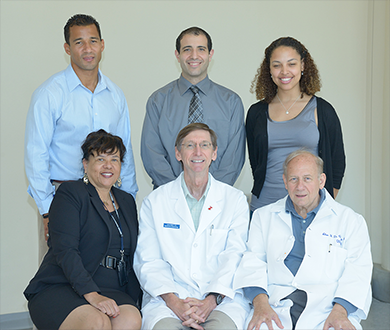You are here: Home > Reproductive Endocrinology and Infertility Training Program
Reproductive Endocrinology and Infertility Training Program
The Intramural NICHD Reproductive Endocrinology and Infertility Training Program sponsors three-year clinical fellowships in Reproductive Endocrinology and Infertility, which are accredited by the American Board of Obstetrics and Gynecology. The program is co-sponsored by the Uniformed Services University of Health Sciences (USUHS). The objective of this graduate medical education program is to train clinicians to serve as researchers and future leaders in the field of reproductive endocrinology with a view toward advancing basic, translational, and clinical science in reproduction. The program was started in 1978 and has since trained over 60 physicians in reproductive endocrinology. Upon completion of the rigorous scientific, clinical, and surgical curriculum, fellows may apply to the American Board of Obstetrics and Gynecology for certification in the subspecialty of Reproductive Endocrinology. Program graduates have become assistant, associate, and tenured professors and departmental chairs at academic, government, and military institutions.
Fellows in the program rotate on clinical services of NICHD–supported intramural graduate medical programs in Medical and Pediatric Endocrinology as well as in Medical Genetics. The clinical training is robust. Thus, within the unique environment of the NIH, fellows participate in evaluation and management of rare and challenging endocrine conditions on the NIH Reproductive Endocrine Teaching Service. Clinical and surgical rotations take place at the Walter Reed National Medical Center and the Shady Grove Fertility Center. Research is strongly emphasized. Trainees in the program must complete a thesis project and may choose among any research laboratory in the Institute’s intramural research program. To complete the research project, fellows are given 20 months of protected research time. The curriculum includes two university-based graduate courses (http://www.usuhs.edu/obg/obgfellowship.html), one in biostatistics and the other in reproduction. In the past year, faculty and fellows published 70 peer-reviewed articles. Over the past five years, graduates of the program published an average of five peer-reviewed manuscripts associated with the training program, and several trainees have received national recognition for excellence in research.
Requirements for enrollment include graduation from a residency in Obstetrics and Gynecology in the United States that is accredited by the American Board of Obstetrics and Gynecology and an active medical license in the United States. Selection is competitive, and prospective candidates must register with the National Resident Matching Program (NRMP). Three positions are approved for a complement of nine fellow trainees. Trainees may meet criteria for the NIH Loan Repayment Program (LRP) for outstanding educational debt. The program accepts applications through the Society for Reproductive Endocrinology and Infertility (http://www.socrei.org/REIApplication). The Program Director is Dr. James Segars; Associate Program Directors are Drs. Alicia Armstrong and William Catherino. Dr. Eric Widra is the on-site director for the Shady Grove Fertility Center rotation.


